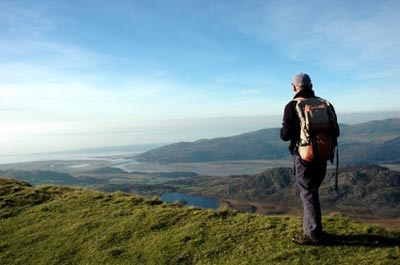(单词翻译:单击)
情景对话
Todd: So, Steven, what do you like to do in your free time?
托德:史蒂文,你在空闲时间喜欢做什么?
Steven: Um, free time. Well, I would just love to have some free time, occasionally I have some free time and well, I love to go hiking. Ah, I live in Japan in Kyuushuu and there are some beautiful mountains quite nearby to where I live so sometimes I go, I go hiking in the mountains.
史蒂文:空闲时间。嗯,我很喜欢空闲时间,我有空闲时间的时候会去远足。我住在日本九州,我住的地方附近有一些漂亮的山,所以有时候我会去那些山上远足。
Todd: Well, actually, I love hiking and I am new to Kyuushuu (Right) I just moved here, so can you tell me where I should go hiking. What are the best spots?
托德:我也很喜欢远足,我刚来到九州(是啊)我刚搬来这里,你能跟我说说我应该去哪远足吗?哪里最好?
Steven: Right, well, there's one range of mountains in Kuju. One of the mountains is called Nakadake, which means central peak, I believe, and that is actually the highest, the highest peak, the highest mountain on mainland Kyuushuu. There is one higher mountain on an island near Kagoshima but on mainland Kyuushuu that's the highest peak and it's quite a challenge and there are some beautiful views from that mountain.
史蒂文:九州有一个叫做Nakadake的山脉,意思是中央峰,我想那是九州最高的山上最高的山峰。鹿儿岛附近的一座岛上有一座更高的山,不过那是九州内陆地区最高的山峰,那绝对是个挑战,而且那座山也有很棒的风景。
Todd: Wow! Is it a day hike? Can I hike it in one day?
托德:哇!那远足可以在一天内完成吗?我能用一天的时间完成吗?
Steven: Oh, sure. It takes about three hours to go up and the descent takes about two hours. It takes about two hours to come back down.
史蒂文:当然。爬到山顶大概需要三个小时,下山需要两个小时左右。下来需要两个小时。
Todd: Oh, that's great well, we live on Beppu and Beppu is on the coast. It's on the ocean, so how can I get to the mountain. Unfortunately, I don't have a car, so can I take the train or a bus?
托德:哦,那太棒了,我住在九州别府,别府在海边。因为在海边,那我怎么去那座山呢?不幸地是,我没有车,那我可以坐火车或是坐公交车去吗?
Steven: Um, I'm not absolutely sure. I've only ever been by car myself. Um, I don't believe there's a train that stops by the mountain but you can certainly get closer than you are now by train, and then you can perhaps take a bus or even a taxi from a town closer by. I don't know. I'm sorry.
史蒂文:嗯,我也不是很确定。我一直是自己开车过去。我想火车在那座山附近没有站,不过坐火车你可以到达离那座山近点的地方,然后再坐公交车或是从附近的城镇打车。我不太清楚,抱歉。
Todd: Oh, that's OK. Well, you know, I've never done it before, but I hear that it's safe to hitchhike in Japan. Is that true?
托德:没关系。你知道,我以前没有做过,不过我听说在日本搭便车很安全,是这样吗?
Steven: Oh, absolutely. Yep. Yep. The crime rate in Japan is so low. You'd have to be incredibly unlucky to have any problems hitchhiking.
史蒂文:完全正确。是这样的。日本的犯罪率非常低。如果你要是在搭便车时遇到麻烦那就太不走运了。
Todd: And will people stop and pick me up?
托德:那人们会停下载我一程吗?
Steven: Ah, that I don't know.
史蒂文:那我就不清楚了。
Todd: Maybe I'll have to give it a try. OK, thanks a lot.
托德:也许我应该试试。非常谢谢你。
Steven: You're welcome.
史蒂文:不客气。

译文属可可原创,仅供学习交流使用,未经许可请勿转载
重点讲解
重点讲解:
1. be new to
新接触的;不熟悉的;
eg. His name was new to me then and it stayed in my mind.
当时我是第一次听到他的名字,就记住了。
eg. I'm new here and all I did was follow orders.
我新来乍到,我所做的事情都是按照命令行事。
2. pick up
(通常指开车)接载,取走;
eg. The taxi driver stopped to pick up a fare.
出租车司机停车让一个乘客上车。
eg. The next morning, my mum came to pick me up.
第二天早上,我的妈妈来接我。
3. give it a try
尝试一下;试试;
eg. I don't think it will lift my spirits but I'll give it a try.
我想那也不会让我的情绪好起来,但我会试试。
eg. I'm willing to give it a try.
我很愿意去体会一下。


